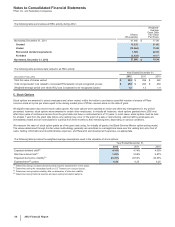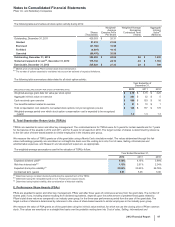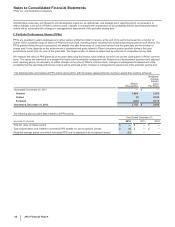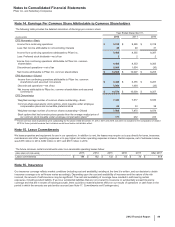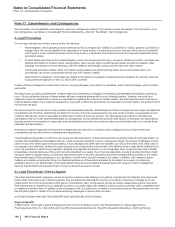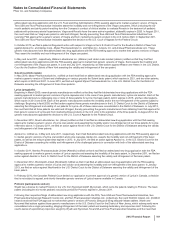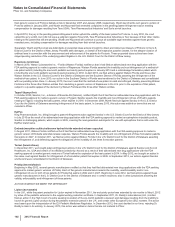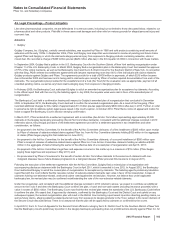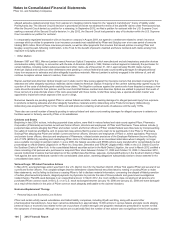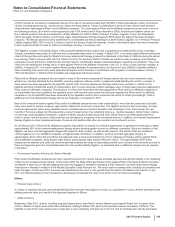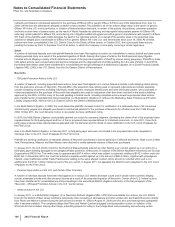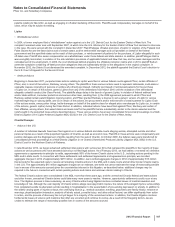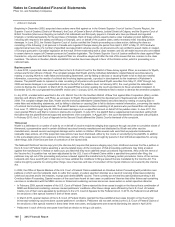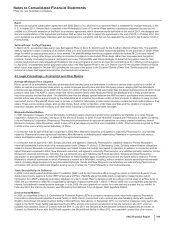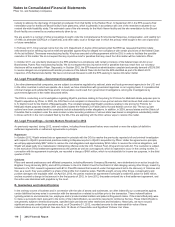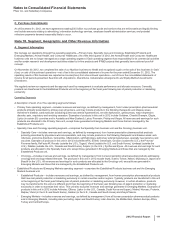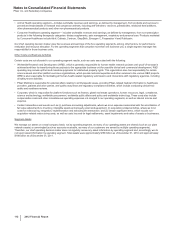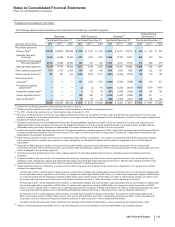Pfizer 2012 Annual Report Download - page 107
Download and view the complete annual report
Please find page 107 of the 2012 Pfizer annual report below. You can navigate through the pages in the report by either clicking on the pages listed below, or by using the keyword search tool below to find specific information within the annual report.
Notes to Consolidated Financial Statements
Pfizer Inc. and Subsidiary Companies
106
2012 Financial Report
indirectly purchased or reimbursed patients for the purchase of Effexor XR or generic Effexor XR from any of the defendants from June 14,
2008 until the time the defendants’ allegedly unlawful conduct ceased. The plaintiffs in all of the actions allege delay in the launch of generic
Effexor XR in the U.S. and its territories, in violation of federal antitrust laws and, in certain of the actions, the antitrust, consumer protection
and various other laws of certain states, as the result of Wyeth fraudulently obtaining and improperly listing certain patents for Effexor XR,
enforcing certain patents for Effexor XR, and entering into a litigation settlement agreement with a generic manufacturer with respect to Effexor
XR. Each of the plaintiffs seeks treble damages (for itself in the individual actions or on behalf of the putative class in the purported class
actions) for alleged price overcharges for Effexor XR or generic Effexor XR in the U.S. and its territories since June 14, 2008. All of these
actions have been consolidated in the U.S. District Court for the District of New Jersey. In October 2012, the court stayed these actions
pending the review by the U.S. Supreme Court of an action, to which the Company is not a party, involving a similar legal issue.
Zoloft
A number of individual lawsuits and multi-plaintiff lawsuits have been filed against us and/or our subsidiaries in various federal and state courts
alleging personal injury as a result of the purported ingestion of Zoloft. Among other types of actions, the Zoloft personal injury litigation
includes actions alleging a variety of birth defects as a result of the purported ingestion of Zoloft by women during pregnancy. Plaintiffs in these
birth-defect actions seek compensatory and punitive damages and the disgorgement of profits resulting from the sale of Zoloft. In April 2012,
the federal birth-defect cases were transferred for consolidated pre-trial proceedings to a Multi-District Litigation (In re Zoloft Products Liability
Litigation MDL-2342) in the U.S. District Court for the Eastern District of Pennsylvania.
Neurontin
•Off-Label Promotion Actions in the U.S.
A number of lawsuits, including purported class actions, have been filed against us in various federal and state courts alleging claims arising
from the promotion and sale of Neurontin. The plaintiffs in the purported class actions seek to represent nationwide and certain statewide
classes consisting of persons, including individuals, health insurers, employee benefit plans and other third-party payers, who purchased or
reimbursed patients for the purchase of Neurontin that allegedly was used for indications other than those included in the product labeling
approved by the FDA. In 2004, many of the suits pending in federal courts, including individual actions as well as purported class actions,
were transferred for consolidated pre-trial proceedings to a Multi-District Litigation (In re Neurontin Marketing, Sales Practices and Product
Liability Litigation MDL-1629) in the U.S. District Court for the District of Massachusetts.
In the Multi-District Litigation, in 2009, the court denied the plaintiffs’ renewed motion for certification of a nationwide class of all consumers
and third-party payers who allegedly purchased or reimbursed patients for the purchase of Neurontin for off-label uses from 1994 through
2004. In May 2011, the court denied a motion to reconsider its class certification ruling.
In 2010, the Multi-District Litigation court partially granted our motion for summary judgment, dismissing the claims of all of the proposed class
representatives for third-party payers and four of the six proposed class representatives for individual consumers. In June 2011, three third-
party payer proposed class representatives appealed both the dismissal and the denial of class certification to the U.S. Court of Appeals for
the First Circuit.
Also in the Multi-District Litigation, in February 2011, a third-party payer who was not included in the proposed class action appealed a
dismissal order to the U.S. Court of Appeals for the First Circuit.
Plaintiffs are seeking certification of statewide classes of Neurontin purchasers in actions pending in California and Illinois. State courts in New
York, Pennsylvania, Missouri and New Mexico have declined to certify statewide classes of Neurontin purchasers.
In January 2011, the U.S. District Court for the District of Massachusetts entered an order trebling a jury verdict against us in an action by a
third-party payer seeking damages for the alleged off-label promotion of Neurontin in violation of the federal Racketeer Influenced and Corrupt
Organizations (RICO) Act. The verdict was for approximately $47.4 million, which was subject to automatic trebling to $142.1 million under the
RICO Act. In November 2010, the court had entered a separate verdict against us in the amount of $65.4 million, together with prejudgment
interest, under California’s Unfair Trade Practices law relating to the same alleged conduct, which amount is included within and is not
additional to the $142.1 million trebled amount of the jury verdict. In August 2011, we appealed the District Court’s judgment to the U.S. Court
of Appeals for the First Circuit.
•Personal Injury Actions in the U.S. and Certain Other Countries
A number of individual lawsuits have been filed against us in various U.S. federal and state courts and in certain other countries alleging
suicide, attempted suicide and other personal injuries as a result of the purported ingestion of Neurontin. Certain of the U.S. federal actions
have been transferred for consolidated pre-trial proceedings to the same Multi-District Litigation referred to in the first paragraph of the
“Neurontin - Off-Label Promotion Actions in the U.S.” section above.
•Antitrust Action in the U.S.
In January 2011, in a Multi-District Litigation (In re Neurontin Antitrust Litigation MDL-1479) that consolidates four actions, the U.S. District
Court for the District of New Jersey certified a nationwide class consisting of wholesalers and other entities who purchased Neurontin directly
from Pfizer and Warner-Lambert during the period from December 11, 2002 to August 31, 2008 and who also purchased generic gabapentin
after it became available. The complaints allege that Pfizer and Warner-Lambert engaged in anticompetitive conduct in violation of the
Sherman Act that included, among other things, submitting patents for listing in the Orange Book and prosecuting and enforcing certain


